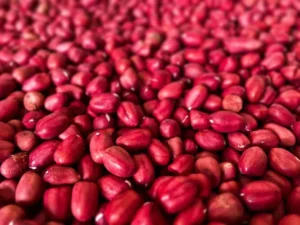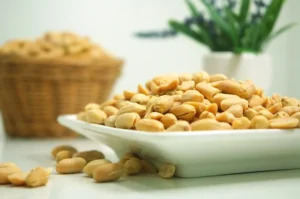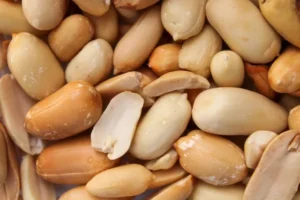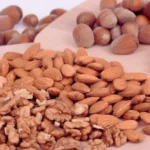20 extraordinary Benefits of Peanuts
Benefits of Peanuts, Nuts are one of the most nutritious types of dry food. And among different types of nuts, almonds are very popular because they have the highest nutritional value among dry foods. Nuts contain fiber, useful fats, proteins, minerals and vitamins along with antioxidants, which play a special role in preventing various diseases including cancer.
This article discusses the benefits of regular consumption of peanuts for the body. Also read the paragraph till the end to know about the right way to eat peanuts and when it can have harmful effects on the body.
Nutritional value of peanuts:
| Energy | 164 calories |
| Sugar | 6.1 grams |
| Fiber | 3.5 grams |
| Non-vegetarian | 6 grams |
| Fat | 14.2 grams |
| Calcium | 76.3 mg |
| Iron | 1 mg |
| Magnesium | 76.5 mg |
| Phosphorus | 136 mg |
| Potassium | 208 mg |
| Zinc | 0.9 mg |
| Copper | 0.3 mg |
| Manganese | 0.6 mg |
| Selenium | 1.2 micrograms |
| Folic acid | 12.5 micrograms |
| Vitamin E | 7.2 mg |
According to the information of Food Data Central (fdc) of the United States, the amount of nutrients in each 1 ounce (28.4 grams) of peanuts is shown in the table: (Brazier, 2019)

Benefits of Peanuts
Along with the elements mentioned in the chart, there are various other nutritional properties in the peanut which have been known through various studies at different times. For example: Anti-oxidants, phytochemicals and flavonoids, plant sterols, phenolic acids etc. At this stage, 35 benefits of almonds are presented through a series of discussions.
Lowers cholesterol levels
There are two types of cholesterol in human blood in which HDL (high density lipoprotein) is good and LDL (low density lipoprotein) is considered as bad cholesterol. With low HDL levels in the blood and high LDL levels, the risk of heart disease increases. High levels of LDL cholesterol are a serious health problem.
Peanuts are rich in monounsaturated and polyunsaturated fats that help lower bad cholesterol or LDL levels. Along with that, the amount of good cholesterol or HDL increases by eating peanuts regularly every day. A study in this regard showed that people who regularly consumed 50 grams of peanuts had a significant reduction in LDL levels and maintained a healthy balance of HDL levels. Along with this, another special benefit has been noticed and that is the reduction of belly fat. That is, along with cholesterol, peanuts also help in reducing belly fat. (Leech, 2018)
Controls high blood pressure
The risk of kidney failure, heart attack, and stroke is increased by high blood pressure. And one of the main causes of high blood pressure is the presence of excess LDL cholesterol in the blood. Peanuts help prevent and control high blood pressure by maintaining blood cholesterol balance.
Almonds also contain a large amount of magnesium and potassium, which play a special role in controlling high blood pressure. Also, vitamin E (alpha tocopherol) present in peanuts can reduce high blood pressure.
Prevents heart disease
Prevents heart disease
There is nothing new to say that heart diseases are very dangerous. Nowadays, the number of people suffering from coronary artery disease or heart disease is increasing and many people are dying prematurely due to this disease. Nutrients in walnuts help in keeping the heart healthy in various ways. For example:
Lowers the level of bad cholesterol (LDL) and increases the amount of good cholesterol (HDL) in the blood. Keeping blood cholesterol in balance reduces the risk of heart disease.

Studies have shown that the antioxidants present in peanuts help maintain healthy blood flow and control high blood pressure. Vitamin E and fiber in walnuts are beneficial for the heart.
Helps in weight loss
Peanuts contain fat which makes people fat easily – this is a misconception. Because the fats in peanuts are healthy fats and also peanuts have a lot of fiber but are relatively low in carbohydrates. Carbohydrate or sugary foods are mainly responsible for the increase in human body weight.
Body weight can be kept under control by developing the habit of eating peanuts instead of various types of fast food and processed food as snacks or light breakfast. Because fast food and processed foods are high in calories, on the other hand, peanuts are relatively low in calories but fill the stomach easily due to high fiber content. A 4-week study of 137 people found that eating 43 grams of peanuts every day reduced hunger and cravings. Also, through some other studies, medical scientists have confirmed that peanuts have the ability to reduce hunger (hunger fighting effects). (Leech, 2018)
Helps prevent diabetes and control blood sugar levels
Nuts are low glycemic index foods, meaning they contain very few carbohydrates or sugars that do not raise blood sugar levels very easily. Instead, it contains healthy fats, good quality meats and plenty of fiber that can satisfy hunger and caloric needs without spiking blood sugar.
Also, magnesium deficiency is seen in most patients with type-2 diabetes. And according to the opinion of medical scientists, magnesium deficiency in the body is linked to insulin resistance or diabetes. In 2011, a study was conducted on 20 patients with type-2 diabetes for 12 weeks. This study found that blood sugar levels were under control when participants were given 60 grams of peanuts per day in addition to their normal diet. Also, based on some other studies, medical scientists believe that regular consumption of peanuts plays a special role in preventing type-2 diabetes.
Helps prevent stroke
Due to blood clots in the blood vessels of the brain due to any reason or disruption of blood flow to the brain due to rupture of blood vessels, it is called stroke which is a fatal disease. Peanut plays a special role in controlling some of the major causes of stroke like overweight, high blood pressure, diabetes etc. which have already been mentioned above.
Another cause of stroke is the increase in the amount of bad cholesterol (LDL-low density lipoprotein) in the blood. Saturated fat and trans fat (Trans fat) increase the amount of bad cholesterol (LDL) in the blood and peanuts contain very little saturated fat and no trans fat at all. Additionally, the mono-unsaturated fatty acids in walnuts help maintain a healthy lipid profile in the blood, which plays an important role in preventing coronary artery disease and stroke.
Read this article to find out which foods contain saturated fat and trans fat.
Improves digestion
Almonds contain a lot of fiber which helps in relieving digestive problems. Also, almond milk can be beneficial for those who have digestive problems after consuming milk. The reason for this is that there is a component called lactose in milk, which causes digestive problems in most people, which is called lactose intolerance in medical terms. Almond milk does not naturally contain lactose, so almond milk is indicated for patients with lactose intolerance. Note that lactose free milk is available in the market which is artificially made lactose free.
Eliminates constipation
Constipation is a common health problem that can be painful and long-term constipation can lead to various diseases such as piles. Almonds contain a lot of fiber which helps in proper digestion of food and relieves constipation. Along with this, the possibility of piles (hemorrhoids) is also reduced due to regular intake of fibrous food.
Helps prevent cancer
Peanuts are rich in fiber which helps prevent colon cancer. A 2015 study also found that eating almonds is linked to a reduced risk of breast cancer. Among the women participating in the study, those who regularly ate almonds were significantly less likely to develop breast cancer than the general population. Medical scientists believe that vitamin E, flavinoids, polyphenols, anti-oxidants, etc. in walnuts help prevent breast cancer. (Brazier, 2019)
Strengthens bones
Protein, minerals like calcium, phosphorus, copper, zinc etc. in peanuts help in bone formation. Phosphorus plays an important role in strengthening teeth. Peanuts also contain small amounts of vitamin D, which is crucial for calcium absorption.

All the nutrients required to maintain bone structure and density as advised by expert doctors are available from peanuts. And so regular consumption of peanuts is recommended for bone protection.
Helps prevent anemia
We all are more or less familiar with the word ‘Anemia’. The word anemia means ‘lack of blood’. Anemia basically means lack of hemoglobin in the blood. People who have anemia can eliminate this problem by eating peanuts. Because walnuts contain copper, iron and vitamins that help to increase the amount of hemoglobin in the blood, thereby eliminating anemia.
Benefits of Peanuts During Pregnancy
Regular consumption of peanuts during pregnancy reduces the risk of birth defects in the pregnant child. Because peanuts contain a large amount of ‘folic acid’ and ‘vitamin B’, the lack of which causes birth defects in the unborn child. And so, to prevent birth defects in children, it is recommended to take foods rich in vitamin B, especially folic acid, starting from a few months before conception.
Also, a common problem during pregnancy is anemia and we already know that groundnut plays an effective role in removing anemia. Iron tablets are prescribed to treat anemia during pregnancy, but it causes constipation. On the other hand, peanuts contain iron, which prevents anemia and also does not cause constipation due to its high fiber content. Although groundnut is a safe food sourced from natural sources, one should consult a Gynecologist to avoid anemia during pregnancy.
Improves memory
Abundant B vitamins and minerals in walnuts strengthen brain cells and sharpen memory. Also, the amount of vitamin E found in 1 ounce of peanuts can meet more than half of the daily requirement. And studies have shown that regular intake of vitamin E reduces the risk of Alzheimer’s disease. (Leech, 2018) It should be noted that Alzheimer’s is a type of disease in which brain function decreases and memory power and thinking ability are lost.
Acts as a moisturizer
Almond also acts as a kind of moisturizer. It helps in removing blackheads and acne on the face. People with oily skin can use almond oil instead of moisturizer. (Jain, n.d.)
Acts as a skin scrubber
It also works as a scrub. Mix half broken almonds with honey and sour curd and massage gently on the face. It works as a natural scrub. Rich in ‘Vitamin E’, this scrub removes dead skin cells and increases the brightness of the skin.
Removes skin wrinkles and reduces the appearance of age
Almonds help in removing skin wrinkles. Massaging the skin with groundnut oil daily will reduce skin wrinkles. Besides, if you mix honey, lemon and almond oil together and use it as a face mask, the skin will become radiant and bright. Thus, it can play a significant role in reducing the appearance of age.
Acts as the secret of youth
As an anti-aging (anti-aging) there is no comparison with peanut oil. Apply a few drops of oil on your face before going to bed at night and wash it off in the morning. Doing this regularly will keep the skin youthful for a long time.
Brightens the skin
Peanut oil contains ‘Vitamin E‘. Vitamin E increases the brightness of the skin and protects the skin from the harmful rays of the sun and prevents sunburn. Regular massage with this oil increases blood circulation in the skin, thus keeping the skin fresh.
Acts as a skin cleanser
Groundnut oil helps to clear the skin. Soak some wood nuts and make a paste after some time. Make a mixture by mixing 1 spoon of honey and 1 spoon of sour curd with almond paste. Massage the face with the mixture for some time and after waiting for a while wash the face with cold water. Regular use of the mixture will keep the skin clean.
Acts as a makeup remover
Almond oil helps lift makeup. Take some cotton and soak it in almond oil. Lightly apply the oil on the face with cotton. Then wipe the face with tissue or cotton. You don’t have to fight to remove makeup from your face but it will come off very easily by using this formula.
Benefits and harms of almonds
As almonds are a food with many benefits, it also has some disadvantages. In many cases, eating peanuts can cause an allergic reaction, the symptoms of which are red spots on the surface of the skin, swelling of the eyes and mouth, difficulty breathing, etc. People with allergies should not eat peanuts
Final Thoughts:
The extraordinary benefits of peanuts span from their nutritional profile to their positive impact on heart health, cognitive function, and emotional well-being. Embracing peanuts as a regular part of your diet not only adds a delicious element to your meals but also contributes to a healthier, happier you. So, go ahead, indulge in the goodness of peanuts and relish the extraordinary benefits they bring to your plate and your life.










